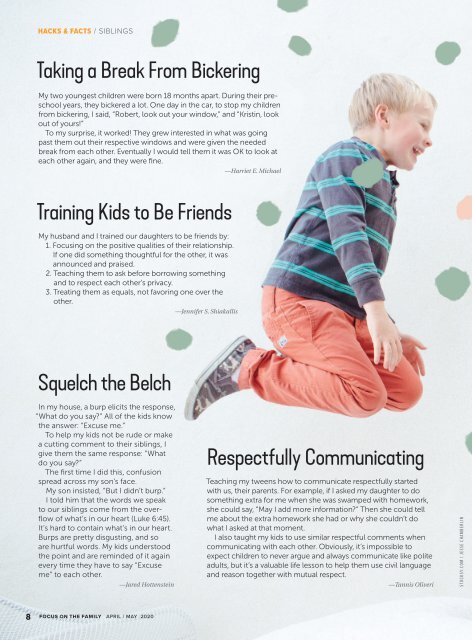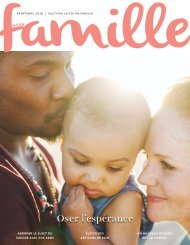Focus on the Family Magazine - April/May 2020
It can be a struggle to raise a family while balancing your work life, social life and relationships. Focus on the Family magazine is here to help! Each complimentary issue delivers fresh, practical Biblical guidance on family and life topics. Every issue comes packed with relevant advice to build up your kids, strengthen your marriage, navigate entertainment and culture, and handle common challenges you may face in your marriage and parenting journeys. Plus you'll find seasonal advice ranging from back-to-school activities to date night tips for you and your spouse.
It can be a struggle to raise a family while balancing your work life, social life and relationships. Focus on the Family magazine is here to help! Each complimentary issue delivers fresh, practical Biblical guidance on family and life topics.
Every issue comes packed with relevant advice to build up your kids, strengthen your marriage, navigate entertainment and culture, and handle common challenges you may face in your marriage and parenting journeys. Plus you'll find seasonal advice ranging from back-to-school activities to date night tips for you and your spouse.
Create successful ePaper yourself
Turn your PDF publications into a flip-book with our unique Google optimized e-Paper software.
HACKS & FACTS / SIBLINGS<br />
Taking a Break From Bickering<br />
My two youngest children were born 18 m<strong>on</strong>ths apart. During <strong>the</strong>ir preschool<br />
years, <strong>the</strong>y bickered a lot. One day in <strong>the</strong> car, to stop my children<br />
from bickering, I said, “Robert, look out your window,” and “Kristin, look<br />
out of yours!”<br />
To my surprise, it worked! They grew interested in what was going<br />
past <strong>the</strong>m out <strong>the</strong>ir respective windows and were given <strong>the</strong> needed<br />
break from each o<strong>the</strong>r. Eventually I would tell <strong>the</strong>m it was OK to look at<br />
each o<strong>the</strong>r again, and <strong>the</strong>y were fine.<br />
—Harriet E. Michael<br />
Training Kids to Be Friends<br />
My husband and I trained our daughters to be friends by:<br />
1. <str<strong>on</strong>g>Focus</str<strong>on</strong>g>ing <strong>on</strong> <strong>the</strong> positive qualities of <strong>the</strong>ir relati<strong>on</strong>ship.<br />
If <strong>on</strong>e did something thoughtful for <strong>the</strong> o<strong>the</strong>r, it was<br />
announced and praised.<br />
2. Teaching <strong>the</strong>m to ask before borrowing something<br />
and to respect each o<strong>the</strong>r’s privacy.<br />
3. Treating <strong>the</strong>m as equals, not favoring <strong>on</strong>e over <strong>the</strong><br />
o<strong>the</strong>r.<br />
—Jennifer S. Shiakallis<br />
Squelch <strong>the</strong> Belch<br />
In my house, a burp elicits <strong>the</strong> resp<strong>on</strong>se,<br />
“What do you say?” All of <strong>the</strong> kids know<br />
<strong>the</strong> answer: “Excuse me.”<br />
To help my kids not be rude or make<br />
a cutting comment to <strong>the</strong>ir siblings, I<br />
give <strong>the</strong>m <strong>the</strong> same resp<strong>on</strong>se: “What<br />
do you say?”<br />
The first time I did this, c<strong>on</strong>fusi<strong>on</strong><br />
spread across my s<strong>on</strong>’s face.<br />
My s<strong>on</strong> insisted, “But I didn’t burp.”<br />
I told him that <strong>the</strong> words we speak<br />
to our siblings come from <strong>the</strong> overflow<br />
of what’s in our heart (Luke 6:45).<br />
It’s hard to c<strong>on</strong>tain what’s in our heart.<br />
Burps are pretty disgusting, and so<br />
are hurtful words. My kids understood<br />
<strong>the</strong> point and are reminded of it again<br />
every time <strong>the</strong>y have to say “Excuse<br />
me” to each o<strong>the</strong>r.<br />
—Jared Hottenstein<br />
Respectfully Communicating<br />
Teaching my tweens how to communicate respectfully started<br />
with us, <strong>the</strong>ir parents. For example, if I asked my daughter to do<br />
something extra for me when she was swamped with homework,<br />
she could say, “<strong>May</strong> I add more informati<strong>on</strong>?” Then she could tell<br />
me about <strong>the</strong> extra homework she had or why she couldn’t do<br />
what I asked at that moment.<br />
I also taught my kids to use similar respectful comments when<br />
communicating with each o<strong>the</strong>r. Obviously, it’s impossible to<br />
expect children to never argue and always communicate like polite<br />
adults, but it’s a valuable life less<strong>on</strong> to help <strong>the</strong>m use civil language<br />
and reas<strong>on</strong> toge<strong>the</strong>r with mutual respect.<br />
—Tannis Oliveri<br />
CREDIT STOCKSY.COM TK / JESSE CHAMBERLIN<br />
8<br />
FOCUS ON THE FAMILY<br />
<strong>April</strong> / <strong>May</strong> <strong>2020</strong>

















